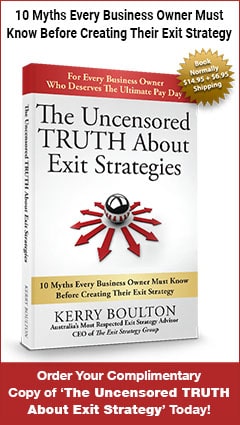Business Blueprint Interview: How to Successfully Sell Your Business for the Best Possible Price, Part 2
When Should You Tell Your Staff About Selling?
You might be wondering at what point in the process you should talk to your staff and go, “Hey, guys, we’re putting the business in the market. We’re going to be selling.” Should you be open and honest and transparent with them and tell them what you are doing?
The answer is really contingent on how you run your business. If you happen to be an open book management type business, then chances are that is exactly what you are going to do. Just tell them and they will know all about it. But like most business owners, you probably will not.
Generally speaking, it’s information you’re going to keep fairly close to your chest for quite a while. It depends on the relationship you have with the staff. I didn’t tell my staff until the last minute because there was a lot at stake.
I think that’s how it goes for the majority of small business owners . They probably will keep it pretty close to their chest.
Keep in mind that the key staff, in particular, are going to be the most affected by the sale of the business. Understanding how it’s going to be from their side is important. And one of the decisions you need to make is how you’re going to look after them, what you plan to do, what you are going to say to them.
A lot of people will be quite happy if there’s an exit and there’s a little bit of a bonus that goes in their pocket, even if they weren’t told about it. But for key staff, staff who would care for you and the business and its future, when the timing is at the stage where you believe you might have someone seriously interested in the business, that’s when it’s key to get them involved.
How Do You Find Hungry Buyers For Your Business?
Well, this comes around to thinking, and thinking strategically – that word I keep mentioning. The most money you’re going to get will be if you can make a sale on a strategic basis. An example would be a larger business taking your customer list and then cross-selling and upselling to that client base.
You have to sit down and really brainstorm what other businesses might be complementary to your business. Not necessarily a competitor, though that is one strategy. A competitor might buy your business. But who might be a complementary business?
As an example, let’s use a small cleaning business. When I say small cleaning business, let’s say the turnover is maybe $700,000-$800,000—a reasonably sized business.
Who else might want to talk to the clients the cleaning business has, if they are not able to offer complementary services? It could be a security company, a maintenance company, or gutter cleaning company. Think about complementary services couldbe offered to your clients.
You are determining who your clients are and who else wants to sell to those clients. And it might not necessarily be the same product. It could be a completely different product that potential strategic buyer has already, and they want to sell their products to your target market. It multiplies the potential ROI and it means that company will pay a higher price for your business . This is what I mean by a strategic buyer.
Another example of a strategic buyer is what is called an industry roll-up. You might have some big players that are looking to get a larger market share so they buy up lots of smaller businesses. Those business transactions are often quite lucrative.
How Do You Find Strategic Buyers?
A really good way to find these strategic buyers is to ask some of the suppliers you might have. Ask them, when they go to non-competing businesses in different industries, who their customers might be. You want to know who you could check into. You’re looking for businesses that could have complementary services you might be able to integrate into your own business. You can flip it around a little so you’re basically doing a little bit of spy work.
If you’re going to one of your suppliers, let’s take the cleaning business example. You might be purchasing some high-powered vacuum cleaners. Just ask them what other businesses do they work with that might be looking for your type of services. You will be surprised who they know. It really is having those confidential but general discussions. That’s one way of doing it.
The other way is just to sit down and brainstorm. Sure, you have friends you can take into your confidence. Most people do. You might be able to sit down with your friend and simply brainstorm who is it that might be a complementary business you could put on your list of potential buyers.
For example, if you sold to a company that has a hundred thousand customers and you only have two thousand customers, they would make more money by taking your products and service and selling them to their larger customer base.
You’re trying to package up an opportunity where someone else can make more money than what you can so they will pay you a better price. It could even be a larger competitor. Talk to your suppliers and see who they know.
And how about finding international players that are looking to get in? One way to do it is to put an ad on Craigslist. It’s as simple as that. You could do that without breaking confidences and just putting out an opportunity you could describe if you’re looking for international buyers.
If you get to an industry trade show and all the big players are there, you can obviously pick up business cards and network with them.
You could also be thinking about your own customers. They are another great source. Your buyer could be amongst your customer list, without a doubt.
And there are special visas for people wanting to immigrate to a country as well and they have to pay a certain amount of money for an actual business. Talking to immigration companies is also another way to go, because those companies assist people with business migration. And they understand what the true motivation is too, because the buyer will have a different agenda than you, the seller.
They will have a completely different agenda, so you really have to get into their heads and think the way they’re thinking.
This is why it’s such a good idea to do an audit before you start talking to any potential buyers.
Should You Try To Sell The Business Yourself?
I would not recommend selling it by yourself at the negotiation stage. You may get your business ready and you may have some targeted potential purchasers you may wish to write to, to invite offers for your business. It’s a matter of really looking at things differently.
However, you must never ever get yourself caught up in the negotiation. It’s the worst place for you to be as the business owner. You do need to bring in a business broker or M & A specialist, depending on the size of your business. I would highly recommend that.
In fact, when you’re selling your business, you need a team of people to help you. You’re going to need help from the legal aspect, as well as accounting, and, as I mentioned, you’re going to need a business broker to do your negotiation. And I would really highly recommend someone who is a mentor to you, the business owner. That might be a person like me who’s the exit strategy person. But it could also be somebody in your own network, who has already been through the process and understands what it’s like, because you need someone else to talk to. Those are the people you need as a minimum.
You very likely will need a financial planner as well. And as I was talking before about the exit audit process, you need to figure out how much money you will really need. A good rule of thumb is the 4% rule.
Say you have a certain amount of capital. Say you need $150,000 or $200,000 a year to live on. That’s what you decide. Well, if you can earn that from a certain amount of capital on a conservative basis, we call that the 4% rule, as in a 4% return. Then you know those are the numbers you’re looking for. A financial planner will take you through that, depending on where you are at in terms of your age.
I’m not a financial planner. I’m not giving people financial advice. But if you had five million dollars in capital and you were to earn 4% per annum, that’s $200,000. Hey, I can live on that. I would be very comfortable with that. How can I make sure I get that amount of capital so that I’m going to have enough money for the rest of my life? Obviously, the numbers change depending on the amount of money you need.
If you do end up with a huge sum of money, that’s a completely different situation for you to be in. There have been some really interesting studies done on suddenly coming into a large sum of money. We have heard the stories about people winning the lotteries and having it disappear in the course of three years.
Well, this is not a dissimilar situation. If you’re a business owner and you do get a really huge payout, what should you do with it? You certainly don’t want to blow it.



Recent Comments